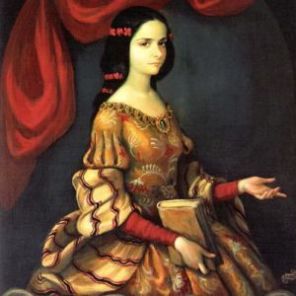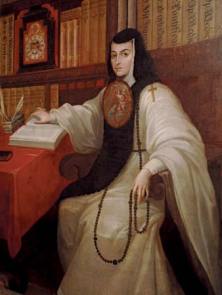Sor Juana Inés de la Cruz writes the letter “Autodefensa Espiritual” to Reverendo Padre Maestro Antonio Núñez de Miranda de la Compañía de Jesús. The letter to Padre Miranda was written in present day México, in the convent de San Jerónimo, in approximately 1681. Father Antonio Núñez de Miranda was someone of importance in Sor Juana’s live because he was her confessor.
Sor Juana was born in the year 1651 in San Miguel Neplantla, México, Juana Inés de Asbaje y Ramíres. She was the illegitimate daughter of a Spanish Captain and a creole woman. She was a devoted child who was raised in her maternal grandfather’s hacienda, where she would hide in the chapel to read the books from her grandfather’s library. Sor Juana learned how to read at the age of three, by the time she was an adolescent, she had mastered Greek logic and at 13 she was teaching Latin to children. Besides her knowledge in Greek and Latin, she also learned Nahuatl. After her grandfather’s death she was sent to México City where she attempted to disguised herself as a male to attend university; however, she fail at her attempt and instead studied privately (Poets.org).
In the letter Sor Juana defends her rights as a religious, devoted, and passionate sister of the order of San Jerónimo de la Ciudad de México. However, she also questions the rules imposed to those women that wish to have an education. Sor Juana argues with her confessor that why should men be the only ones deserving of an education and why women should be excluded from one. Sor Juana states, “…pero los privados y particulares estudios, ¿quién los ha prohibido a las mujeres? ¿No tienen alma racional como los hombres? Pues, ¿por qué no gozará el privilegio de la ilustración de las letras con ellos? —¿Qué revelación divina, qué determinación de la Iglesia, qué dictamen de la razón hizo para nosotras tan severa ley? ¿Las letras estorban, sino que antes ayudan a la salvación?” (Sor Juana 1681). Sor Juana argues that the right to knowledge should be accessible to both men and women. More interestingly, she argues that who are the ones deciding for women and if whether it has been determined through a divine revelation that states that women are not deserving of knowledge.
Moreover, Sor Juana questions the church’s patriarchal system, but she also challenges the powerful members of the Catholic Church in México to respond to her questioning. She cannot be only identified as the first woman to be part of philosophical era dominated by men, but she also is the first known woman to challenge the power of the ecclesiastical system; she is also the first one to defend women’s rights to have an education.
In “Autodefensa Espiritual,” Sor Juana not only defends her right to be an educated woman, she also advoacates for her religious vocation. Sor Juana states that “Si he leído los poetas y oradores profanos (descuido en que incurrió el mismo Santo) también leo los Doctores Sagrados y Santas Escrituras…”(Sor Juana 1681). Sor Juana defends her religiosity by stating that she not only reads those texts that are deemed inappropriate for a nun, but that she also reads the Holly Testament. In a sense, it can be argued, that Sor Juana is defending herself as a religious being but she is also arguing that she should not be judged for reading and studying other great writers because she is a dedicated and devoted sister.
Sor Juana, in her latter to Father Antonio Núñez de Miranda, states that her vast knowledge is not only a threat to men but also to women. Sor Juana states, “Las mujeres sienten que las exceda; los hombres, que parezca que los igualo; unos no quisieran que supiera tanto; otros dicen que había de saber más, para tanto aplauso. Las viejas no quisieran que otras supieran más; las mozas que otras parezcan bien, y unos y otros que viese conforme a las reglas de su dictamen…” (Sor Juana 16 81). Although she is a person that has vast knowledge and someone who can make anyone uncomfortable, she is also the target of different ideologies of her time. The gender systems are different and a woman who is educated will contradict the system and be considered a threat to it because she is defying the odds.
81). Although she is a person that has vast knowledge and someone who can make anyone uncomfortable, she is also the target of different ideologies of her time. The gender systems are different and a woman who is educated will contradict the system and be considered a threat to it because she is defying the odds.
Furthermore, Sor Juana states that “Pues, ¿por qué para salvarse ha de ir por el camino de la ignorancia, si es repugnante a su natural?” (Sor Juana 1681). Sor Juana questions why should one be oblivious when one should be aware of everything around. That one should not be ignorant in order to reach salvation because it is a contradiction to that of nature, but rather, that in order to reach salvation one should be knowledgeable.
In her defense, Sor Juana writes to Núñez de Miranda, “Si estas reprensiones cayeran sobre alguna comunicación escandalosa mía, soy tan dócil que (no obstante que ni en lo espiritual ni temporal he corrido nunca por cuenta de Vuestra Reverencia) me apartara de ella y procurara enmendarme y satisfacerle, aunque fuera contra mi gusto” (Sor Juana 1681). If all the scandalous rumors about her were to be true, she is so vulnerable, to the authority of her superiors, that not even with his intersection she would be free of charge rather she would be reprimanded even against her will. Even when she accumulates knowledge that knowledge would be insignificant to her defense, because she is seen as a rebellious sister that does not adhere to the rules that are imposed by the church. Her knowledge would be of second nature because she will be chastised because her writings are of an offense to the spirituality of a nun and to the Catholic Church.
While Sor Juana lived a life of knowledge, she also lived a life of oppression for wanting to pursue an education with the same rights that a man had during the colonial period in México. One cannot denied that Sor Juana made major contributions to the literature of women but also was a major advocate for women’s rights; someone who rebelled against the gender system imposed by the Spanish in order to have an autonomy away from the church. She was a woman who defied what was to be a woman in the colonial period, but most importantly a woman in the church; she challenge the male-centered perception of women, overall.
Essay written for my Chicana/o Studies Course (History of the Chicana/Mexicana)
Work Cited
De la Cruz, Sor Juana Inés. “Autodefensa Espirtual de Sor Juana.” 1681. Carta de Sor Juna Inés de la Cruz a su Confesor Autodefensa Espiritual. Tapia Méndez, Aureliano. Monterrey, N.L. Mêxico. Print. 51-55.
Poets.org. Academy of American Poets, n.d. Web. 12 Mar. 2015.
